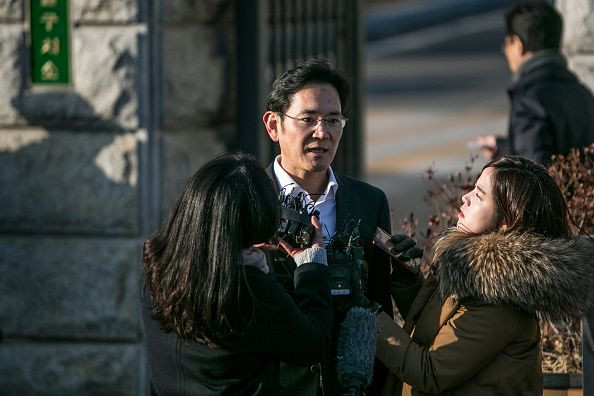Samsung Heir Lee Jae-Yong Leaves Jail After Court Reduces Sentence, Suspends Remainder

Samsung’s heir and vice-chairman Jay Y. Lee, also known as Lee Jae-Yong, was released from the Seoul Detention Center in Uiwang after a South Korean appeals court suspended his sentence over bribery Monday.
In August 2017, Lee was found guilty of bribing Choi Soon-si, a confidante of then president Park Geun-hye — who was impeached for the same crime — and was sent to prison for five years. He later appealed his sentence, which was ruled in his favor by cutting it down to two and a half years. He will be on a four-year probation.
After the ruling, Lee walked out of the court room without having to serve the rest of his sentence in prison.
“Again, I feel sorry to everyone for not showing my best side. And it has been a really precious time for a year reflecting on myself,” Lee told reporters.
According to Bloomberg, judge Cheong Hyung-sik said that Lee was a victim of power wielded by the president and his confidante.
“Power-business collusion is not found here,” the judge said. “The essence of this case is that the defendant passively answered to political power.”
Shares in Samsung Electronics, covered earlier losses and closed up 0.5 percent, compared to a 1.3 percent fall in the wider market, Reuters reported.
Samsung reported record profit last week disclosing numbers that it's chip business pulls in more revenue than the intel corp. Last week the shares of Samsung went surging as it unveiled a 50-to-1 stock pit, Bloomberg reported.
It is not clear whether Lee will resume his position as vice-chairman. The 49-year-old heir to the largest conglomerates in South Korea is the son of Lee Kun-he, chairman of Samsung Group and the grandson of Samsung founder Lee Byung-chul.
He became the vice-chairman of Samsung Electronics, a company renowned for making gadgets from smartphones and televisions to cameras and hard drives, in 2013. However, since his father’s heart attack in 2014, he took over the reins of the company as an acting boss in his father’s stead.
In August 2017, Lee was convicted of bribery and embezzlement charges linked to a political –corporate scandal, which also involved the country’s then president Park Geun-hye. The latter was impeached for her role in the scandal. She faced corruption charges, an allegation she had vehemently denied.
Samsung was accused of paying 43bn won ($36.4m; £30.3m) to two non-profit foundations operated by the former president’s friend and confidante Choi Soon-si in exchange for political favors.
According to reports, the favor to which the bribe was proffered included backing a merger that needed the support from the government-run pension fund that will pave the way for Lee to eventually succeed his father as the head of the conglomerate. Lee conceded that he had given donations to the organization but denied he had received any favors in return.
Prosecutors of the case argued that Lee was aware of the relationship between the former president and her friend and chose this information to aid his deal.
“It’s truly disappointing,” Park Yong-jin, a National Assembly member from Moon’s party, said in a statement. “We confirmed once again that Samsung is above the law and the court.”
This isn’t the first instance where a top executive was allowed to walk free after he was accused of or convicted of corruption in South Korea. In the past too, the sentences of many people convicted of crimes had been suspended or were pardoned by the president.
Kwon Young-june, a professor who researches corporate governance at Seoul’s kyung Hae University, said he was startled to see the practice of letting powerful men off the hook with suspended sentences was still raging in South Korea. Following the court's ruling he said, "It’s startling to see that the practice of letting chaebol chiefs get away with suspended sentences is continuing.”
“We have a new president in office, but the ‘Republic of Samsung’ lives on,” he added.
© Copyright IBTimes 2024. All rights reserved.





















